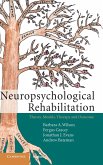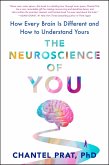Stephen J. Wood / Nicholas B. Allen / Christos Pantelis (ed.)
The Neuropsychology of Mental Illness
Herausgeber: Wood, Stephen J.; Pantelis, Christos; Allen, Nicholas B.
Stephen J. Wood / Nicholas B. Allen / Christos Pantelis (ed.)
The Neuropsychology of Mental Illness
Herausgeber: Wood, Stephen J.; Pantelis, Christos; Allen, Nicholas B.
- Gebundenes Buch
- Merkliste
- Auf die Merkliste
- Bewerten Bewerten
- Teilen
- Produkt teilen
- Produkterinnerung
- Produkterinnerung
Describes neuropsychological approaches to the investigation, description, measurement and management of a wide range of mental illnesses.
Andere Kunden interessierten sich auch für
![Neuropsychological Rehabilitation Neuropsychological Rehabilitation]() Barbara A. WilsonNeuropsychological Rehabilitation189,99 €
Barbara A. WilsonNeuropsychological Rehabilitation189,99 €![Medical Hypnosis Primer Medical Hypnosis Primer]() Arreed Barabasz / Karen Olness / Robert Boland / Stephen Kahn (ed.)Medical Hypnosis Primer57,99 €
Arreed Barabasz / Karen Olness / Robert Boland / Stephen Kahn (ed.)Medical Hypnosis Primer57,99 €![Sleep and Mental Illness Sleep and Mental Illness]() Sleep and Mental Illness215,99 €
Sleep and Mental Illness215,99 €![The Child's World of Illness The Child's World of Illness]() Simon R. WilkinsonThe Child's World of Illness208,99 €
Simon R. WilkinsonThe Child's World of Illness208,99 €![The Neuroscience of You The Neuroscience of You]() Chantel PratThe Neuroscience of You19,99 €
Chantel PratThe Neuroscience of You19,99 €![Abolishing the Concept of Mental Illness Abolishing the Concept of Mental Illness]() Richard HallamAbolishing the Concept of Mental Illness184,99 €
Richard HallamAbolishing the Concept of Mental Illness184,99 €![The Psychology of Lying and Misrepresentations The Psychology of Lying and Misrepresentations]() Gianfranco DenesThe Psychology of Lying and Misrepresentations177,99 €
Gianfranco DenesThe Psychology of Lying and Misrepresentations177,99 €-
-
-
Describes neuropsychological approaches to the investigation, description, measurement and management of a wide range of mental illnesses.
Hinweis: Dieser Artikel kann nur an eine deutsche Lieferadresse ausgeliefert werden.
Hinweis: Dieser Artikel kann nur an eine deutsche Lieferadresse ausgeliefert werden.
Produktdetails
- Produktdetails
- Verlag: Cambridge University Press
- Seitenzahl: 464
- Erscheinungstermin: 17. Oktober 2013
- Englisch
- Abmessung: 260mm x 208mm x 29mm
- Gewicht: 1209g
- ISBN-13: 9780521862899
- ISBN-10: 0521862892
- Artikelnr.: 26572867
- Herstellerkennzeichnung
- Libri GmbH
- Europaallee 1
- 36244 Bad Hersfeld
- gpsr@libri.de
- Verlag: Cambridge University Press
- Seitenzahl: 464
- Erscheinungstermin: 17. Oktober 2013
- Englisch
- Abmessung: 260mm x 208mm x 29mm
- Gewicht: 1209g
- ISBN-13: 9780521862899
- ISBN-10: 0521862892
- Artikelnr.: 26572867
- Herstellerkennzeichnung
- Libri GmbH
- Europaallee 1
- 36244 Bad Hersfeld
- gpsr@libri.de
Dedication; Foreword; Preface; List of contributors; Part I.
Neuropsychological Processes: 1. Developmental neuropsychology: normative
trajectories and risk for psychiatric illness; 2. Processes and mechanisms
in neuropsychiatry: sensory-perceptual; 3. Processes and mechanisms in
neuropsychiatry: motor-executive processes; 4. The neurobiology of the
emotion response: perception, experience, and regulation; 5. Frontal
asymmetry in emotion, personality and psychopathology: methodological
issues in electrocortical and hemodynamic neuroimaging; 6. Approaches to
understanding language dysfunction in neuropsychiatric disorders: insights
from the study of schizophrenia; 7. Associative memory; 8. The neural basis
of attention; 9. The role of executive functions in psychiatric disorders;
10. Decision-making; 11. The neuropsychology of social cognition:
implications for psychiatric disorders; Part II. The Importance of Methods:
12. Psychiatric diagnoses: purposes, limitations and an alternative
approach; 13. Neuropsychological methods in mental disorders research:
illustrations from methamphetamine dependence; 14. The study of emotion and
the interaction between emotion and cognition: methodological perspectives;
15. Neurophysiology: using neurophysiological techniques to study auditory
hallucinations in schizophrenia; 16. Neuroimaging; 17.
Psychopharmacological modeling of psychiatric illness; 18. Cognitive
phenomics; Part III. The Neuropsychology of Psychiatric Disorders: 19.
Neuropsychology of ADHD and other disorders of childhood; 20. A
multidimensional neurobehavioral model of personality disorders; 21.
Neuropsychology in eating disorders; 22. Neurobiological and
neuropsychological pathways into substance use and addictive behaviour; 23.
Neuropsychology of obsessive-compulsive disorder; 24. Neuropsychological
investigation in mood disorders; 25. Manic distractibility and processing
efficiency in bipolar disorder; 26. Schizophrenia; Part IV. Integration and
Synthesis: Are Mental Illnesses Disorders of Consciousness? A Trialogue
between Neuroscientific, Philosophical, and Psychiatric Perspectives: 27.
Mental illness and the consciousness thesis; 28. A nonreductive physicalist
account of affective consciousness; 29. Consciousness of oneself and others
in relation to mental disorders; 30. Trialogue: commentaries on 'are mental
illnesses disorders of consciousness?' Comments on Panksepp and on Vogeley
and Newen; Affective consciousness and the psychiatric comfort zones of
experienced life; The definition and the constitution of mental disorders
and the role of neural dysfunctions; Response to commentaries;
Understanding affects: toward a neurobiology of primary process
mentalities; Replies to comments by Jaak Panksepp and by G. Lynn Stephens
and George Graham.
Neuropsychological Processes: 1. Developmental neuropsychology: normative
trajectories and risk for psychiatric illness; 2. Processes and mechanisms
in neuropsychiatry: sensory-perceptual; 3. Processes and mechanisms in
neuropsychiatry: motor-executive processes; 4. The neurobiology of the
emotion response: perception, experience, and regulation; 5. Frontal
asymmetry in emotion, personality and psychopathology: methodological
issues in electrocortical and hemodynamic neuroimaging; 6. Approaches to
understanding language dysfunction in neuropsychiatric disorders: insights
from the study of schizophrenia; 7. Associative memory; 8. The neural basis
of attention; 9. The role of executive functions in psychiatric disorders;
10. Decision-making; 11. The neuropsychology of social cognition:
implications for psychiatric disorders; Part II. The Importance of Methods:
12. Psychiatric diagnoses: purposes, limitations and an alternative
approach; 13. Neuropsychological methods in mental disorders research:
illustrations from methamphetamine dependence; 14. The study of emotion and
the interaction between emotion and cognition: methodological perspectives;
15. Neurophysiology: using neurophysiological techniques to study auditory
hallucinations in schizophrenia; 16. Neuroimaging; 17.
Psychopharmacological modeling of psychiatric illness; 18. Cognitive
phenomics; Part III. The Neuropsychology of Psychiatric Disorders: 19.
Neuropsychology of ADHD and other disorders of childhood; 20. A
multidimensional neurobehavioral model of personality disorders; 21.
Neuropsychology in eating disorders; 22. Neurobiological and
neuropsychological pathways into substance use and addictive behaviour; 23.
Neuropsychology of obsessive-compulsive disorder; 24. Neuropsychological
investigation in mood disorders; 25. Manic distractibility and processing
efficiency in bipolar disorder; 26. Schizophrenia; Part IV. Integration and
Synthesis: Are Mental Illnesses Disorders of Consciousness? A Trialogue
between Neuroscientific, Philosophical, and Psychiatric Perspectives: 27.
Mental illness and the consciousness thesis; 28. A nonreductive physicalist
account of affective consciousness; 29. Consciousness of oneself and others
in relation to mental disorders; 30. Trialogue: commentaries on 'are mental
illnesses disorders of consciousness?' Comments on Panksepp and on Vogeley
and Newen; Affective consciousness and the psychiatric comfort zones of
experienced life; The definition and the constitution of mental disorders
and the role of neural dysfunctions; Response to commentaries;
Understanding affects: toward a neurobiology of primary process
mentalities; Replies to comments by Jaak Panksepp and by G. Lynn Stephens
and George Graham.
Dedication; Foreword; Preface; List of contributors; Part I.
Neuropsychological Processes: 1. Developmental neuropsychology: normative
trajectories and risk for psychiatric illness; 2. Processes and mechanisms
in neuropsychiatry: sensory-perceptual; 3. Processes and mechanisms in
neuropsychiatry: motor-executive processes; 4. The neurobiology of the
emotion response: perception, experience, and regulation; 5. Frontal
asymmetry in emotion, personality and psychopathology: methodological
issues in electrocortical and hemodynamic neuroimaging; 6. Approaches to
understanding language dysfunction in neuropsychiatric disorders: insights
from the study of schizophrenia; 7. Associative memory; 8. The neural basis
of attention; 9. The role of executive functions in psychiatric disorders;
10. Decision-making; 11. The neuropsychology of social cognition:
implications for psychiatric disorders; Part II. The Importance of Methods:
12. Psychiatric diagnoses: purposes, limitations and an alternative
approach; 13. Neuropsychological methods in mental disorders research:
illustrations from methamphetamine dependence; 14. The study of emotion and
the interaction between emotion and cognition: methodological perspectives;
15. Neurophysiology: using neurophysiological techniques to study auditory
hallucinations in schizophrenia; 16. Neuroimaging; 17.
Psychopharmacological modeling of psychiatric illness; 18. Cognitive
phenomics; Part III. The Neuropsychology of Psychiatric Disorders: 19.
Neuropsychology of ADHD and other disorders of childhood; 20. A
multidimensional neurobehavioral model of personality disorders; 21.
Neuropsychology in eating disorders; 22. Neurobiological and
neuropsychological pathways into substance use and addictive behaviour; 23.
Neuropsychology of obsessive-compulsive disorder; 24. Neuropsychological
investigation in mood disorders; 25. Manic distractibility and processing
efficiency in bipolar disorder; 26. Schizophrenia; Part IV. Integration and
Synthesis: Are Mental Illnesses Disorders of Consciousness? A Trialogue
between Neuroscientific, Philosophical, and Psychiatric Perspectives: 27.
Mental illness and the consciousness thesis; 28. A nonreductive physicalist
account of affective consciousness; 29. Consciousness of oneself and others
in relation to mental disorders; 30. Trialogue: commentaries on 'are mental
illnesses disorders of consciousness?' Comments on Panksepp and on Vogeley
and Newen; Affective consciousness and the psychiatric comfort zones of
experienced life; The definition and the constitution of mental disorders
and the role of neural dysfunctions; Response to commentaries;
Understanding affects: toward a neurobiology of primary process
mentalities; Replies to comments by Jaak Panksepp and by G. Lynn Stephens
and George Graham.
Neuropsychological Processes: 1. Developmental neuropsychology: normative
trajectories and risk for psychiatric illness; 2. Processes and mechanisms
in neuropsychiatry: sensory-perceptual; 3. Processes and mechanisms in
neuropsychiatry: motor-executive processes; 4. The neurobiology of the
emotion response: perception, experience, and regulation; 5. Frontal
asymmetry in emotion, personality and psychopathology: methodological
issues in electrocortical and hemodynamic neuroimaging; 6. Approaches to
understanding language dysfunction in neuropsychiatric disorders: insights
from the study of schizophrenia; 7. Associative memory; 8. The neural basis
of attention; 9. The role of executive functions in psychiatric disorders;
10. Decision-making; 11. The neuropsychology of social cognition:
implications for psychiatric disorders; Part II. The Importance of Methods:
12. Psychiatric diagnoses: purposes, limitations and an alternative
approach; 13. Neuropsychological methods in mental disorders research:
illustrations from methamphetamine dependence; 14. The study of emotion and
the interaction between emotion and cognition: methodological perspectives;
15. Neurophysiology: using neurophysiological techniques to study auditory
hallucinations in schizophrenia; 16. Neuroimaging; 17.
Psychopharmacological modeling of psychiatric illness; 18. Cognitive
phenomics; Part III. The Neuropsychology of Psychiatric Disorders: 19.
Neuropsychology of ADHD and other disorders of childhood; 20. A
multidimensional neurobehavioral model of personality disorders; 21.
Neuropsychology in eating disorders; 22. Neurobiological and
neuropsychological pathways into substance use and addictive behaviour; 23.
Neuropsychology of obsessive-compulsive disorder; 24. Neuropsychological
investigation in mood disorders; 25. Manic distractibility and processing
efficiency in bipolar disorder; 26. Schizophrenia; Part IV. Integration and
Synthesis: Are Mental Illnesses Disorders of Consciousness? A Trialogue
between Neuroscientific, Philosophical, and Psychiatric Perspectives: 27.
Mental illness and the consciousness thesis; 28. A nonreductive physicalist
account of affective consciousness; 29. Consciousness of oneself and others
in relation to mental disorders; 30. Trialogue: commentaries on 'are mental
illnesses disorders of consciousness?' Comments on Panksepp and on Vogeley
and Newen; Affective consciousness and the psychiatric comfort zones of
experienced life; The definition and the constitution of mental disorders
and the role of neural dysfunctions; Response to commentaries;
Understanding affects: toward a neurobiology of primary process
mentalities; Replies to comments by Jaak Panksepp and by G. Lynn Stephens
and George Graham.








